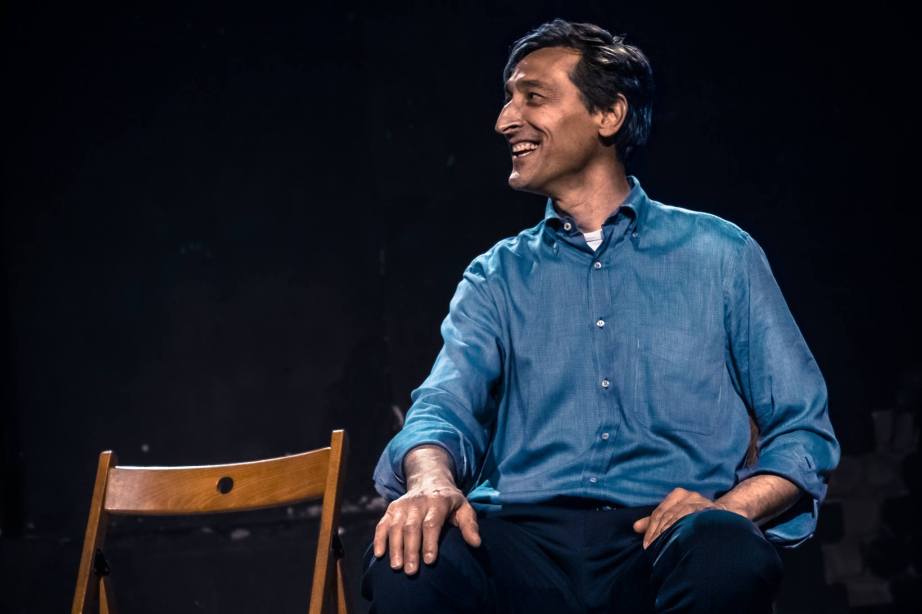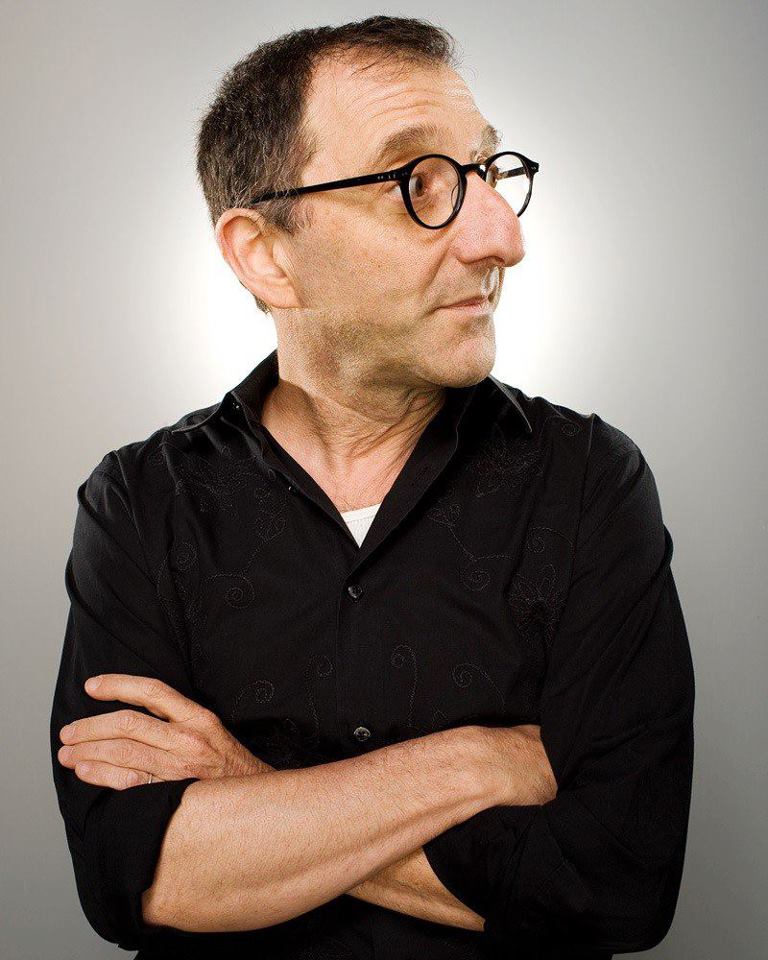James Gangl is one of Canada’s awesomest improvisers. He’s a comedian, writer, storyteller, filmmaker, member of Bad Dog Theatre Company, and performer with improv troupe extraordinaire, Bonspiel! His one-man show, Sex, Religion & Other Hang-ups won the Ed Mirvish Award for Entrepreneurship and a Canadian Comedy Award. Follow him at: https://twitter.com/jamesgangl

When did you first know you wanted to do improv/comedy/acting for a living? What were you doing before?
I always felt like an actor. I remember when I was three I would put signs up all over the house that read “the show starts in five minutes.” Then I’d herd my parents and whatever guests were over into our living room so I could put on a show. Of course I hadn’t planned the show…who needs a script, right? I just demanded attention, jumping up and down on the sofa and making up songs about vampires.
I knew I wanted to do it for a living as soon as I realized there was a living to be made. Again, I always loved it so I guess my dream was to be an actor but I was also super practical so I got a degree in Business and Computing instead. I worked in marketing for five years while auditioning on the side until I finally made the leap to focus on my passion full time.
Who has had the greatest influence on your career, and why?
Jesus.
I grew up super-religious and every aspect of my life was touched by my belief system. Mostly I just felt guilty about swearing and being lewd on stage but eventually my experience with religion became a wealth of inspiration for my writing.
Besides Jesus, my brother Alex was an excellent influence. My family wasn’t unsupportive of my ambition but they weren’t supportive either. I always looked up to my brother Alex and he was the only member of my immediate family who openly celebrated my love of performing. He was always behind me and he went to all my high school plays, beaming from the front row. He’d even brag about me to his friends. I get warm fuzzies just thinking about it now. His encouragement was a key motivator.
What was your first paid improv-related job?
A guy, let’s call him Jeff, from my level D improv class invited me to play a version “slide show” at his 40th birthday party. My job was to make up the narrative to Jeff’s life using real slides that were being projected. As slides flashed onto the screen I’d point to the people projected and label them as “Uncle Henry, the alcoholic” and “money grubbing Aunt Louise.” Unfortunately, the slides involved his real family and friends who sat shocked and offended in the audience. In hindsight, it may have gone better is I was actually introduced and the audience was told that I was improvising. Instead I was some stranger talking smack about the families most initiate memories. Ah well, hindsight is 20-20. $40 well earned.
How much have former instructors, coaches, and team members played a part in your career?
Their influence is huge. When I started I was watching Slap Happy (Kerry Griffin, Sandy Jobin-Bevans, Dave Pearce, and Tabetha Wells) tear it up. I thought what they did WAS improv, period. So I copied them completely. Alumnae Cafe was huge with Bob Martin, Jack Mosshammer, Paul O’Sullivan and Linda Kash…god were those folks pros. They made me realize how good improv really could be.
As I got better so did my friends and colleagues and because improv is my work and my play, my colleagues became my best friends. Now my pals are helping my growth. Jan Caruana regularly helps me with scripts and I’m always bouncing ideas off Alastair Forbes, Rob Baker and Ashley Botting. Really, at this point I’m surrounded by stupidly talented people. I’m making a movie with former Theatresports member Alex Hatz, I get photos done with Big in Japan Alumni, Kevin Thom… Most of my artsy projects are done with improviser pals.
Do you see improv as a means to doing other work, or an end in itself?
Yes.
Look, if you are doing improv because you want to be a great actor, stop doing improv. If you are doing improv to become a great stand-up, stop doing improv. Same for sketch and film and music and cooking. Take an acting class, write jokes, write some sketches, buy a tambourine and a Dutch oven…that will get you to your goal quicker. Having said that, if you do improv because you love it, you will continue to do it. That’s what happened to me. I loved it. I was addicted. I couldn’t stop.
Improv was my introduction to the world of performance and became my means to doing other work. Spending hours becoming a better improviser improved my stage presence and acting ability. It gave me confidence in my comedy. It helped me in front of the camera and gave me the motivation to write. It was the catalyst that lead me to everything else and continues to influence my work in wonderful ways. Having said that, there’s not a lot of money in improv. So YES! Beautiful improv is amazing and wondrous and fulfilling…but, if you want to live off your art you will likely need to learn how to act and/or write.
When you hear the words “working improviser,” what comes to mind?
I think a working improviser is someone who is regularly performing, teaching, coaching and directing improv. At the moment I don’t think it’s possible to sustain yourself with performing improv alone. At the very least a “working improviser” will be teaching as well.
My advice to the improviser that wants to pay rent is this: Get yourself an agent. Like right away. The agent doesn’t have to be good, they just have to send you out for commercials. Improv prepares you best for commercials. The ad industry loves improvisers even if they don’t know it! Ads are usually 30 seconds long and comedic, and therefore they use broad archetypes like “the geek,” “the love interest,” “the goof,” “the thug” as their staple characters. When I started improvising all I did was broad characterizations and that’s exactly the kind of stuff ad folks want. Plus you can improvise! Throw in a button at the end of your audition and everyone will think you’re a genius. Plus, commercials can pay tons of money. So…go get an agent. (And it wouldn’t hurt if you took some on camera classes as well. Acting in front of the camera is much smaller.)
Describe a typical day in your life.
The days are really different. A typical week looks like me going to a handful of auditions and prepping them if they are big and chunky. I cook a lot of my own meals, which is great because I can easily keep a stew bubbling as I run lines. I write too. I’m on the pitch list for DNTO and regularly come up with pitches for stories I want to tell on the radio. At night I teach and do the odd show and try to flirt with girls. And play embarrassing board games that 15-year-olds play.
What’s the salary range for an improviser in your city?
Honestly, I don’t really know. Most improvisers are doing other things to pay the rent. Here’s the range for various improv related sources of income: For teaching you make anywhere from $30 – 55/hr (CAD$). For coaching maybe $20 – 50/hr depending on who you are and who the troupe is. You might get paid $20 – $40 and some beer tickets to do shows at an improv or sketch stage at night. If you can get into corporate workshops or shows, well that’s a whole other story (put an additional zero on those numbers).
As a side note: if a producer invites top talent to play and uses their names on the bill, the talent should be treated very well. Be nice, buy drinks, have snacks. You’ll want the talent to come back even if you can’t afford to pay them well on that particular night. Having said that, if that producers fills the room they should pay well too (add zeros).
Improv has been steadily infiltrating corporate and popular culture. With all of the interest in improvisation, why is it still so difficult to get bums on seats at shows? (Or is it, in your experience?)
I think the amount of people seeing improv has been rising steadily. Fifteen years ago there were maybe two or three improv shows that ran weekly. Those shows had ups and downs like shows do today. Compare that with today where there are three shows a night (at least). That’s part of the reason it’s hard to get bums in seats. The audiences have grown but the amount of improv performances have increased exponentially and so there is lots of competition for eyeballs.
The second problem is an old one but it persists: People don’t know what improv is. Yes, its popularity has been growing, but compare improv with more popular mediums and the challenge becomes obvious. Movies have trailers that tell you what you’re getting into. Stand-up is funny and has years and years of TV exposure. Even today, every late night talk show on network television starts with a stand-up set. Improv is slightly harder to explain and hence the barrier to entry is higher.
People order the same thing at the same restaurant because they know they’ll like it; improv is still an unknown element.
There are a zillion improv shows. Having a zillion show dilutes audiences, so even if the total amount of people going has increased, the number of improv show has increased exponentially too.
What’s the best, worst, or weirdest improv gig you’ve done?
The best improv gig I ever did was in Vienna. I was a green improviser but I convinced Jim Libby at the English Lovers to let me play. It was the opening night of their new season and the space was big and beautiful and jam-packed. We were doing a montage and if the scene started in English it would continue in English but if it started in German it would continue in German. I speak German like a three-year-old and the audience found that out pretty quickly. The more I tried to speak the language (and failed), the more the audience loved me. The show ended with an improvised musical number. My scene partner was a professional opera singer with the Vienna State Opera and I wasn’t. Still, as the underdog I got to sing the last verse in terribly broken German and the crowd leapt to their feet. A standing ovation at an improv show… Crazy.
Do you think it’s easier to make a living as an improviser today than it was when you were starting out?
100%. There’s way more awareness and that has led to bigger houses, more students, more corporate work and more opportunity. Fifteen years ago paid improv coaches were virtually unheard of, now it’s common. It’s not easy, but there is money to be made.
Where do you see yourself 10 years from now?
Hopefully splitting my time between LA and Toronto. I love my city, but am also loving all my experiences in front of the camera. That’s driving me toward LA. I hope my day job is regular TV and film work, and I get to continue to write and perform my own solo work.
Either that or learning to cook professionally in Chile.






